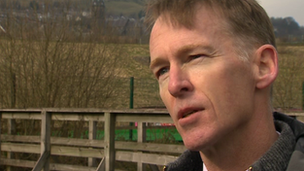Natural Resources Wales: £50m pension deficit for new body
- Published
Natural Resources Wales takes over on April after a merger of three environment bodies
A new environment organisation which is being set up by the Welsh government is facing a £50m pensions deficit.
The Countryside Council for Wales, Environment Agency and the Forestry Commission are merging to form a single organisation Natural Resources Wales aimed at saving £158m over 10 years.
But the IT system designed to make it operate is not ready and the pension debt is larger than first thought.
The Welsh government says its business case is not undermined though.
The business case for the merger allocated £19m to cover the pension debt of amalgamating staff into a single organisation, but the Welsh government has told BBC Wales it could cost around £50m.
Other options are open to the government but it has been asked to approve the £50m choice as the "only option that has a degree of certainty" of being achievable by 1 April when the new organisation will be formed.
There are further problems with the amount of deficit in the Environment Agency pension schemes still unresolved.
Jon Owen Jones, chairman of Forestry Commission Wales said there were "several problems".
He said: "They've got an IT system they can't get to work as quickly as they like; they've got a IT system that's going to cost more than they anticipated; they've got a pension system that's going to cost more than they've anticipated and, they've got services they're going to buy in from England that are going to cost more than they've anticipated."

NSR chief executive Emyr Roberts says he is unaware of the size of the pension deficit
Emyr Roberts, chief executive of Natural Resources Wales (NRW) concedes the IT system is unlikely to work properly for a year or two but says he is unaware of the size of the pension deficit.
"I'm not familiar with those figures, I don't know what those figures might be," he said.
"As I understand it, talks are ongoing specifically on the pensions front so there are some options there."
He has to work within the confines of a business case inherited by the Welsh government and civil servants.
Craig Palfrey, financial planner with Cardiff-based firm Penguin, said after reading the government's pension options with Environment Agency staff it was hard to plan for the cost.
"The last paper I saw said it was 94% funded which compared to a lot of schemes is fantastic but as we speak today it could now be down to 85% or up to 110.
"But it's really difficult because you don't know how long people will live for, when they'll retire. This scheme may have to be open for 60 or 70 years yet. That's why they've asked for the Welsh government to underwrite it, because they don't know what it's going to cost at this stage."
But a Welsh government spokesman said the economic case for NRW is strong.
"Changes to the cost of pensions alongside other changes do not undermine the conclusions of the business case, or the decision to proceed with creating NRW.
"Changes to public sector pension provision by the UK Government impacted on the solution proposed in the business case.
"Therefore, the new pension scheme will cost more than the figures stated in the original business case.
"A considerable proportion of this cost would still have had to be paid by the Environment Agency Wales in any event ."
- Published25 October 2012
- Published6 October 2012
- Published27 April 2012